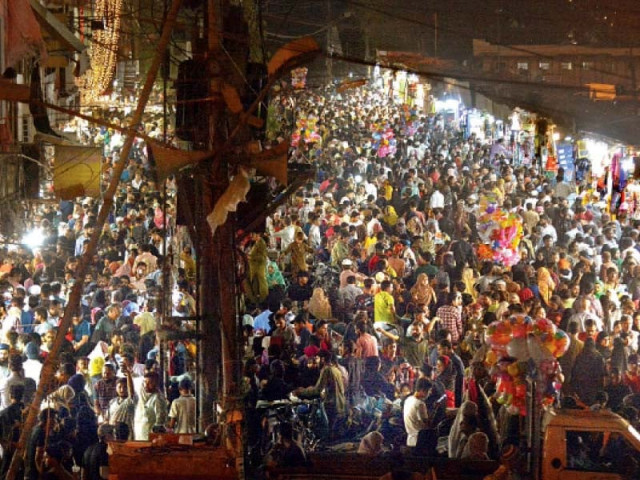Double-digit inflation dampens Eid shopping spirit
Cloth sellers and tailors report unprecedented drop in sales, orders

As the populace battles inflation by making lifestyle alterations to reduce consumption and limit monthly expenditures, the demoralising repercussions of a loss in purchasing power have toned down the enthusiasm of Eid preparations.
While the arrival of Eid has always been a popularly anticipated affair, drawing a large number of families from all social strata to markets for purchasing clothes, shoes, and accessories; the recent economic downslide has deeply impacted the ardour of low-income families, who are no longer showing the willingness to buy new garments, when the provision of bread and butter itself has become a challenging ordeal.
“I went to the bazaar hoping to buy a dress and a pair of shoes for each of my four children, but was shocked to discover that the total cost exceeded my budget,” shared Faria, who was out window shopping. “My husband is a low-grade civil servant with a meagre salary and Eid shopping has become extremely challenging for middle-class families like us,” she added.
Concurring with Faria, Faraz, a salesman at a car repair shop, who has a family of four, said that celebrating Eid has become a costly affair this year. “Last year, our bill was Rs 6,000 when my wife and I went out to shop, but this year the same items have put us back Rs 8,000,” he complained, adding that they had to reconsider their buying choices.
Faria and Faraz’s predicament has impacted retailers as well. According to multiple clothing outlets, the sales this year have reduced by almost 30 to 40 per cent given the spike in inflation. While a majority of low-income citizens are refraining from buying fancy items for their wardrobe altogether, those choosing to shop have carefully altered their selection of dresses and number of purchases.
As Khurram, a manager at a traditional clothing shop located on Tariq Road revealed, “with the current level of inflation many buyers this year have started preferring single ready-to-wear shalwar kameez over unstitched fabric since the former is almost 50 per cent cheaper.”
Such an alteration in consumer behaviour has come as a bolt out of the blue for tailors, who nostalgically recall more prosperous times when long queues would form outside their shops during the latter half of Ramazan.
“Last year, we had to put up boards saying “house full” outside our shops because we received so many orders before Eid. This year, our work has gone down by almost 50 per cent since people are not willing to spend extra money on stitching,” regretted Muhammad Naeem, a tailor.
Tailors however are not the only ones whose work during the latter third of Ramazan has been impacted by the double-digit inflation.
Various charity organisations who collect Eid gifts including clothes, shoes and jewellery for distribution among underprivileged families, claim that the scale of their donations this year has remarkably gone down.
“Philanthropists have greatly narrowed their level of contribution this year since the prices of donation boxes have increased by a whopping 30 per cent,” informed Imran, a volunteer at a local non-governmental organisation (NGO).
Commenting on this dampened spirit of Eid, Atiq Mir, President of the All Karachi Traders Union, felt that it was only natural for the joy of Eid to be diminished by the deplorable state of the economy. “Inflation has urged people to become cautious buyers therefore, you will find very few people eager to shop this Eid,” said Mir while talking to The Express Tribune.
Published in The Express Tribune, April 20th, 2023.



















COMMENTS
Comments are moderated and generally will be posted if they are on-topic and not abusive.
For more information, please see our Comments FAQ